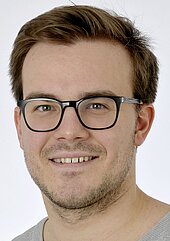Feldhaus, Stephan
Dissertation topic:
"Beyond Sebald. The air war in narrative texts of the post-war period (1945-1952/1959)."
Congratulations on passing the oral examination on 13 January 2026.
Contact address at the University of Würzburg:
Chair of Digital Humanities and Modern German Literature
and Modern German Literature
Institute of German Philology
Am Hubland
97074 Würzburg
First supervisor: PD Dr Katrin Dennerlein
Second supervisors:
Prof. Dr Hans-Edwin Friedrich (Univ. Kiel)
Class in the Graduate School: "Philosophy, Languages, Arts"
Doctorate in the Graduate School from WS 2020/21.
Abstract:
W.G. Sebald triggered a debate in literary studies almost three decades ago with his thesis that German post-war literature had failed to come to terms with the air war and its consequences. This doctoral project begins by presenting Sebald's theses and the ensuing debate. After an outline of Sebald's concept of a 'natural history of destruction' and his positive and negative critiques of other authors' texts on air war, his biographical self-description in his volume of essays Luftkrieg und Literatur (Air War and Literature) is examined in particular. This is understood as a strategy by Sebald to pursue his own rewriting of the air war, which is problematised because it uses eyewitness reports and historiographical studies as a reservoir of texts, although Sebald casts doubt on their epistemic value.
The work then focusses on the actual subject of the Sebald debate: the air war literature of the post-war period. It is shown how, building on general reflections on the revision of canons, it was possible to track down an extensive corpus of previously unnoticed post-war narrative texts on the air war in review organs and literary histories of the post-war period as well as through catalogue searches, and how the known textual basis was more than tripled. It is particularly noteworthy that 12 texts by female authors, who were underrepresented in the previous research corpus, were also identified.
The narratological-rhetorical section primarily uses the analytical categories of duration, distance and focalisation to show how some texts attempt to capture the air war in its synaesthetic and temporal dimension with a high degree of narrative and rhetorical complexity. In addition, the fruitfulness of the novella genre in coming to terms with the air war is outlined. On the level of the history of mentalities, the discussion of German guilt in the texts of the corpus is traced. While the idea of retribution often refers to German guilt, two exculpatory strategies are also recognisable: the defence against so-called 'collective guilt' and the attribution of guilt to a Nazi ruling class as well as the criticism of a technology that would have taken on a life of its own and the killing. On a socio-historical level, it can be stated above all that air war texts describe the experiences on the war front and the so-called 'home front' as equivalent in their horror and that they often document the long-term psychological consequences of the air war. Repeated reference is also made to the fate of animals, which often appear as companions of people in the air war.






